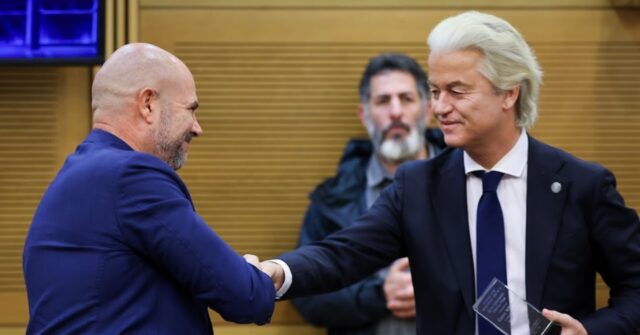During a recent visit to Israel, Dutch populist leader Geert Wilders was awarded the Jabotinsky Prize for Liberty by Knesset Speaker Amir Ohana. This recognition reflects Wilders’ long-standing commitment to the Jewish state and his robust opposition to radical Islam. While in Israel, Wilders engaged in discussions with prominent figures, including Prime Minister Benjamin Netanyahu and President Isaac Herzog, reinforcing his diplomatic agenda and alliance with the nation. Wilders emphasized that the award symbolizes recognition for his courage in combating misinformation and injustice perpetuated by international entities like the International Criminal Court, which he claims often distort truth to favor terrorism.
Wilders’ advocacy for Israel extends beyond mere political rhetoric; he has supported the Jewish state actively from a young age, including a year of volunteer service in the West Bank. During his Israeli tour, he unequivocally articulated the importance of the West Bank settlements, declaring them as essential to Israel’s survival. He referred to these settlements in the Jordan Valley as Israel’s “bulletproof vest,” underscoring his belief that they are crucial for national security. His stance is that a robust Israeli presence in the West Bank is vital given the existential threats emanating from regional adversaries.
In the aftermath of the tragic events of October 7, 2023, when a significant loss of innocent Jewish lives occurred, Wilders called for a firm stance in support of Israel. He criticized global responses, claiming that while initial reactions may show compassion for the victims, the international narrative quickly shifts to condemning Israel’s self-defense actions. He argued that the Jewish state has a right to defend itself against groups like Hamas, Islamic Jihad, Hezbollah, and Iran, which he characterizes as “evil powers.” His visit was framed not only as a diplomatic effort but as a moral obligation to show unwavering support for Israel in its fight against radical threats.
Wilders also expressed concern about the increasing anti-Israel sentiment fueled by radical Islamist ideology and a perceived “self-hatred” within Western societies. He lamented that such anti-Semitism is often overlooked or dismissed in favor of a narrative that blames Israel for its defensive measures. According to Wilders, the fight for Israel’s survival is indicative of a broader struggle against radicalism that threatens Western values and civilization itself. He asserted that if Israel were to falter in this battle, the implications for the West would be severe and far-reaching, thus underlining the interconnectedness of global security today.
In an article he penned for Breitbart London, Wilders encouraged European patriots to rally behind Israel, viewing it as a model for maintaining national sovereignty. He criticized the globalist agenda that seeks to undermine European nation-states, contrasting it with Israel’s recent reassertion of its identity as a sovereign nation. Wilders posited that the Jewish state’s determination to defend its integrity and borders stands in stark opposition to the trends within Europe where national identities face dilution from supranational institutions like the EU. He framed Israel’s resilience as an inspiration for Western nations, proposing that European leaders should adopt a similar staunch approach to national sovereignty.
Ultimately, Wilders positioned himself as a voice for those within Europe who support Israel and reject the narratives that undermine its legitimacy. His visit and the honor conferred upon him by the Knesset serve as a reminder of the political struggles facing both Israel and Western nations grappling with radical ideologies. Wilders’ message is one of solidarity and a clarion call for decisive action against forces that he believes threaten both Israel and the broader Western democratic framework. He hopes to inspire leaders across Europe to embrace their national identities and stand firm against radicalism, drawing parallels between the Jewish experience and the challenges that many European nations currently face.

